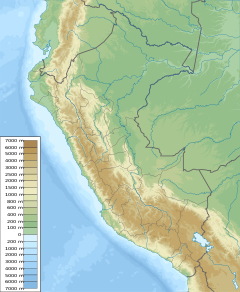Mountain in Peru
| Auquihuato | |
|---|---|
 The cinder cone at the margin of the light-colored plateau just below the center of this NASA Landsat image (with north to the top) is Auquihuato. The cinder cone at the margin of the light-colored plateau just below the center of this NASA Landsat image (with north to the top) is Auquihuato. | |
| Highest point | |
| Elevation | 4,980 m (16,340 ft) |
| Listing | Volcanoes of Peru |
| Coordinates | 15°04′30″S 73°11′26″W / 15.07500°S 73.19056°W / -15.07500; -73.19056 |
| Geography | |
 | |
| Location | Ayacucho Region, Peru |
| Parent range | Andes |
| Geology | |
| Mountain type | Cinder cone |
Auquihuato (possibly from Quechua, awki: prince, watu: prediction, fortuneteller) is a cinder cone in the Andes of Peru, 4,980 metres (16,339 ft) high. It is situated in the Ayacucho Region, Paucar del Sara Sara Province, on the border of the districts Colta and Oyolo. Auquihuato lies northeast of Sara Sara volcano.
Geology
Context
Auquihuato is surrounded by a Pliocene volcanic plateau, the cone formed on the plateau's southern margin. Sara Sara lies 30 kilometres (19 mi) southwest, and Firura lies 10 kilometres (6.2 mi) farther east. Auquihuato lies east of the main volcanic arc and is aligned with several other volcanic centres in a northwest-southeast line.
Volcano
Auquihuato is c. 400 metres (1,300 ft) high and a lava flow extends southward from the cone, reaching a length of 12 kilometres (7.5 mi). The lava flow has a pahoehoe texture and a thickness of 50 metres (160 ft). It has well developed levees.
Activity
The stratovolcano developed during the Pleistocene and Holocene. The noticeable lava flow is of Holocene age but no radiometric dating is available and no historical eruptions are known. The Geophysical Institute of Peru began to monitor the geodesy of the system in 2019 and it is considered a low-hazard volcano.
Ground deformation has been observed by InSAR observation, centered 7 kilometres (4.3 mi) southeast of Auquihuato and with a circular shape. The ground deformation may be caused by changes in the pressure within the volcano's magma system, at depths probably exceeding 1 kilometre (0.62 mi), but an origin in a hydrothermal system is also possible. Volcano-tectonic earthquakes have been recorded.
References
- ^ "Cerro Auquihuato". Global Volcanism Program. Smithsonian Institution. Retrieved 17 June 2023.
- ^ Peru 1:100 000, Pausa (31-p). IGN (Instituto Geográfico Nacional - Perú).
- Teofilo Laime Ajacopa, Diccionario Bilingüe Iskay simipi yuyayk'ancha, La Paz, 2007 (Quechua-Spanish dictionary): awki. - s. Príncipe. Hijo de un ser superior o de un rey. watu. - s. Cordón. Cuerda delgada. watuq, wamuni, umu.. - s. Adivino. Persona que adivina. || fig. Hechicero, brujo. Layqa.
- Diccionario Quechua - Español - Quechua, Academía Mayor de la Lengua Quechua, Gobierno Regional Cusco, Cusco 2005: awki - s. Mit. En la mitología inkaica y la actual andina, man o espíritu protector, personaje mítico que habita en las altas cumbres, ser protector encamado en los montes, el alma de los cerros elevados. Generalmente se usa en plural: awkikuna, espíritus protectores. SINÓN: apucha, machula. || Príncipe, hijo del Inka. || Abuelo. watu - - s. Augurio, pronóstico, predicción, vaticinio, presagio. Ec: huatu. || Cordón, pita, cuerda, hilo retorcido. || Cinturón, correa.
- escale.minedu.gob.pe - UGEL Map of the Paucar del Sara Sara Province (Ayacucho Region)
- ^ Morales Rivera, Anieri M.; Amelung, Falk; Mothes, Patricia (July 2016). "Volcano deformation survey over the Northern and Central Andes with ALOS InSAR time series". Geochemistry, Geophysics, Geosystems. 17 (7): 2869–2883. doi:10.1002/2016GC006393.
- de Silva, SL; Francis, PW (March 1990). "Potentially active volcanoes of Peru-Observations using Landsat Thematic Mapper and Space Shuttle imagery". Bulletin of Volcanology. 52 (4): 286–301. doi:10.1007/BF00304100. S2CID 140559785.
- ^ Centeno Quico, Riky; Rivera, Marco (April 2020). "Reconocimiento automático de señales sísmicas de origen volcánico para la alerta temprana de erupciones volcánicas del sur del Perú".
- Sur, Instituto Geofísico del Perú Observatorio Vulcanológico del (December 2017). "Investigación y monitoreo de volcanes activos en el sur del Perú. Reporte técnico especial 2017".
This Ayacucho Region geography article is a stub. You can help Misplaced Pages by expanding it. |